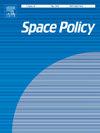The potential for conflict in cislunar space: Findings from a tabletop exercise
IF 1.9
4区 社会学
Q2 INTERNATIONAL RELATIONS
引用次数: 0
Abstract
A number of state and non-state actors have lunar ambitions. Growing competition and a lack of internationally-agreed principles or rules governing activity in this region have raised the possibility that international activity on the Moon could result in heightened tensions or even conflict. To examine the possibility of conflict resulting from activities on the Moon, we designed a tabletop exercise (TTX) set in 2029, just five years in the future from the perspective of participants. In the exercise, countries and private entities find themselves in a hypothetical scenario involving conflicting interests in regard to a commercial “safety zone” claim. To probe these potential responses, we asked space policy professionals to play the roles of specific countries in which they had expertise. Using an observational wargame approach, we were able to explore how dialogue and negotiations may proceed among partners and between potential adversaries in order to generate new observations and hypotheses. The TTX suggested a number of issues that may be of relevance to future lunar conflicts. This included include the importance of the specific entities involved in the crisis and the ordering of events; the procedural legitimacy and inclusion of all relevant parties in the process of settling the conflict; the need for relevant scientific and technical expertise; and need to address the legitimacy and appropriate role of the private sector activity on the Moon. The final game outcome was a recommendation for both non-government and UN-sponsored meetings to develop appropriate guidelines for preventing future conflicts.
地月空间的潜在冲突:桌面演习的结果
许多国家和非国家行为体都有月球野心。日益激烈的竞争和缺乏管理该地区活动的国际商定原则或规则,增加了在月球上的国际活动可能导致紧张局势加剧甚至冲突的可能性。为了研究月球上的活动导致冲突的可能性,我们设计了一个桌面演习(TTX),时间设定在2029年,从参与者的角度来看,这仅仅是未来五年。在演习中,各国和私营实体发现自己处于一种假想情景,涉及商业“安全区”主张方面的利益冲突。为了探讨这些可能的回应,我们请空间政策专业人员扮演他们具有专门知识的具体国家的角色。通过观察兵棋推演的方法,我们能够探索如何在合作伙伴之间和潜在对手之间进行对话和谈判,以产生新的观察和假设。TTX提出了一些可能与未来月球冲突相关的问题。这包括涉及危机的具体实体的重要性和事件的顺序;程序上的合法性和所有有关各方参与解决冲突的进程;对有关科学和技术专门知识的需要;需要解决私营部门在月球上活动的合法性和适当作用。最后的游戏结果是建议非政府和联合国主办的会议制定防止未来冲突的适当准则。
本文章由计算机程序翻译,如有差异,请以英文原文为准。
求助全文
约1分钟内获得全文
求助全文
来源期刊

Space Policy
Multiple-
CiteScore
3.40
自引率
36.40%
发文量
40
期刊介绍:
Space Policy is an international, interdisciplinary journal which draws on the fields of international relations, economics, history, aerospace studies, security studies, development studies, political science and ethics to provide discussion and analysis of space activities in their political, economic, industrial, legal, cultural and social contexts. Alongside full-length papers, which are subject to a double-blind peer review system, the journal publishes opinion pieces, case studies and short reports and, in so doing, it aims to provide a forum for the exchange of ideas and opinions and a means by which authors can alert policy makers and international organizations to their views. Space Policy is also a journal of record, reproducing, in whole or part, official documents such as treaties, space agency plans or government reports relevant to the space community. Views expressed in the journal are not necessarily those of the editors or members of the editorial board.
 求助内容:
求助内容: 应助结果提醒方式:
应助结果提醒方式:


